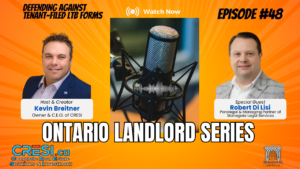What is a Legal Basement Apartment & What makes it a Legal unit in Ontario?
A legal basement apartment is simply described as a home within a home. It is a separate living space in the lower level of the property. In Ontario, these are also called “secondary suites.” They have their own entrance, kitchen, bathroom, and living space.
Many Ontario homeowners add basement apartments to help with their mortgage payment’s. A basement apartment does more than help pay your mortgage and boost your income. As a landlord, you can earn between $800 to $2,500 per month, depending on the size of the unit and where your home is located.
Majority of the basement apartments in Ontario are not legal or to code. To be legal, your basement apartment must follow:
- Ontario Building Code rules
- Fire Code safety rules
- Your munipality’s/city’s zoning rules
- Electrical Safety rules
Each municipality/city in Ontario may have different rules. For example, Toronto, Ottawa, Hamilton, and London each have their own specific rules about basement apartments. Make sure you know what Ontario’s standards and regulations are, plus what the municipality requires where the property is located.
Benefits of Having a Legal Basement Apartment
As a landlord, having a legal basement apartment gives you:
- Peace of mind: Your apartment meets all safety standards
- Better insurance: Insurance companies prefer legal units
- Higher rent: Legal units often attract better tenants who pay more
- Fewer problems: Legal status helps avoid fines and complaints
- Better resale value: Your house is worth more with a legal secondary suite
Signs Your Basement Apartment Might Be Illegal
Your basement apartment might be illegal if it:
- Doesn’t have a separate entrance
- Has ceiling height less than 6.5 feet
- Has windows too small for emergency escape
- Lacks proper fire separation between units
- Has no smoke or carbon monoxide detectors
- Has bedrooms with no windows
- Doesn’t have proper permits from your city
How to Make an Illegal Basement Apartment Legal in Ontario
Step 1: Check Your Zoning
First, check if your home’s zoning allows basement apartments. Call your city’s planning department or check their website. Most Ontario cities now allow basement apartments, but there may be special rules about:
- Parking spaces
- Lot size
- Distance between homes
Step 2: Hire Professionals
Making a basement legal is not a DIY job. You will need:
- A contractor who knows the Ontario Building Code
- A licensed electrician
- A licensed plumber
- Maybe an architect or designer
Step 3: Apply for Permits
You need permits before starting work. This usually means:
- Building permit
- Electrical permit
- Plumbing permit
- HVAC (heating and air) permit
Step 4: Meet Building Code Requirements
Your basement apartment must have:
- Ceiling height: At least 6.5 feet (1.95 meters) in most spaces
- Separate entrance: Direct access to the outside
- Fire safety: Proper fire separation between units (usually 30-minute fire rating)
- Windows: Bedroom windows must be big enough for emergency escape
- Smoke detectors: Connected units on each level
- Carbon monoxide detectors: Near sleeping areas
- Electrical: Separate electrical panel is often required
- Kitchen and bathroom: Proper venting and plumbing
Step 5: Get Inspections
Once work is complete, you need inspections for:
- Building structure
- Electrical systems
- Plumbing systems
- Fire safety
Step 6: Register Your Apartment
Some Ontario cities require you to register your legal basement apartment. You might need to:
- Pay a registration fee
- Get regular safety inspections
- Renew your registration every few years
Common Challenges When Making a Basement Apartment Legal
1. Ceiling Height Issues
Low ceilings are the biggest problem in older homes. If your ceiling is too low, you might need to:
- Dig deeper (very expensive)
- Lower the floor (also expensive)
- Apply for a minor variance (sometimes possible)
2. Window Size Problems
Bedroom windows must be big enough for someone to escape in an emergency. If your windows are too small, you need to:
- Enlarge window openings
- Add new windows
- In some cases, add a door directly to the outside
3. Separate Entrance Requirements
Your basement apartment needs its own entrance. Options include:
- Using an existing side or back door
- Adding an entrance at ground level
- Building an entrance with exterior stairs
- Creating a walkout entrance if your lot allows
4. Costs to Legalize a Basement Apartment
Making a basement apartment legal in Ontario usually costs between $20,000 to $50,000. This depends on:
- How much work your basement needs
- Your home’s age and condition
- Local contractor rates
- Permit costs in your city
Legal Responsibilities as a Basement Apartment Landlord
Once your basement apartment is legal, you must:
- Follow the Ontario Residential Tenancies Act
- Provide and maintain a safe home
- Make repairs when needed
- Give proper notice before entering
- Follow rent increase rules
- Keep good records
- Give receipts for all payments
Ontario Cities Where Basement Apartments Are Popular
Basement apartments are most common in:
- Toronto and the GTA
- Ottawa
- Hamilton
- London
- Kitchener-Waterloo
- Windsor
- Barrie
- Guelph
Each city has slightly different rules, so check with your local city hall.
Final Tips for Ontario Landlords
- Get everything in writing: Have a clear lease agreement.
- Screen tenants carefully: Check references and credit.
- Set clear rules: About noise, parking, and shared spaces.
- Join a landlord association: For support and information.
- Keep up with maintenance: It’s easier than big repairs later.
- Have an emergency fund: For unexpected repairs.
- Get landlord insurance: Regular home insurance isn’t enough.
- Connect with CRESI Property Management: To help with all the day to day and anything and everything that will arise
Making your basement apartment legal takes time and money. But it protects you, your property, and your tenants. A legal basement apartment is a smart investment for Ontario landlords.
Need More Help?
Connect with us Today at www.CRESI.ca or call 289-266-1617
Related: Stress-free tools for landlords



